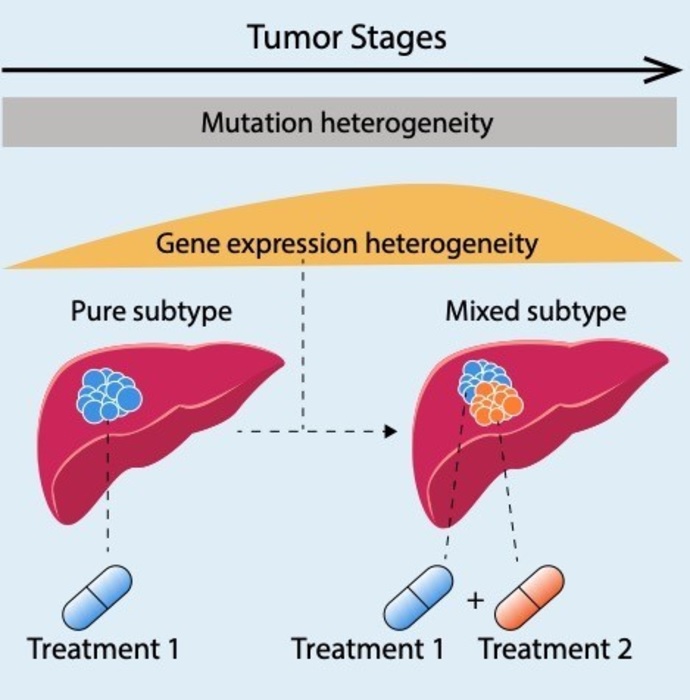Clinical scientists and scientists from the National Cancer Center Singapore (NCCS) and A*STAR Genome Institute Singapore (GIS), in collaboration with Singapore General Hospital (SGH), National University Health System, Duke-NUS Medical School, Nanyang Technological University, and collaborators from China, Malaysia, Thailand, and the Philippines, have described a dynamic genomic landscape of tumor heterogeneity in hepatocellular carcinoma (HCC).
This research comes from one of the largest prospective HCC cohorts known as the Precision Medicine in Liver Cancer in the Asia-Pacific Network (PLANet) study. These new findings from PLANet were recently published in the journal National Science Review (NSR) [1].
Summary Intratumoral heterogeneity (ITH) is a key challenge in cancer treatment, but previous studies have mainly focused on genomic alterations without exploring phenotypic (transcriptomic and immune) heterogeneity. Using one of the largest prospective surgical cohorts for hepatocellular carcinoma (HCC) with multi-region sampling, we sequenced whole genomes and paired transcriptomes from 67 HCC patients (331 samples). We found that while genomic ITH was fairly constant across TNM stages, phenotypic ITH had a very different trajectory and diversified rapidly in stage II patients. Most strikingly, 30% of patients were found to contain more than one transcriptomic subtype within a single tumor. Such phenotypic ITH was found to be much more informative in predicting patient survival than genomic ITH and explains the poor efficacy of single-target systemic therapies in HCC. Taken together, we not only reveal an unprecedented dynamic picture of phenotypic heterogeneity in HCC, but also highlight the importance of studying phenotypic evolution in all cancer types. |

Figure 1: Hepatocellular carcinomas (HCC) diversify during tumor evolution, leading to multiple coexisting subtypes in a significant proportion of HCC that will require combination systemic therapies to treat the disease. Credit: A*STAR Singapore Genome Institute
HCC is the seventh most common cancer worldwide, but the fourth leading cause of cancer death globally due to its high mortality rate [2].
Surprisingly, a disproportionate 80% of the disease burden falls on Asian populations. Despite many efforts, there is currently no validated predictive biomarker for systemic therapies in HCC and treatment efficacy remains poor.
To address this unmet clinical need, a multidisciplinary, multi-institutional collaborative team was awarded funding to establish the Flagship Clinical and Translational Research (TCR) Program in Liver Cancer, which is supported by funding from the National Research Foundation of Singapore and is administered by the National Medical Research Council (NMRC) of the Ministry of Health, Singapore [3].
In this program, the PLANet study was initiated to enroll a prospective cohort of HCC patients working with the Asia-Pacific Hepatocellular Carcinoma (AHCC) Trial Group in several Asian countries.
Specifically, PLANet aims to understand the molecular diversities within a tumor known as intratumoral heterogeneity (ITH), as well as how we can use such understanding to guide patient stratification and treatment in HCC. In 2017, the group found that HCC has a wide range of genetic ITH among patients [4].
The study and its findings
The current study is based on a cohort of 67 patients from four Asian countries from the PLANet study and is the first multi-omic data layered ITH study (genome, transcriptome, immunome) in HCC.
The researchers found variations in different regions of the same tumor for genetic (DNA mutation) and transcriptomic (RNA expression) profiles. In particular, they found that the level of such variations differs between patients and more than 30% of patients show high transcriptomic ITH where a single tumor could contain multiple transcriptomic subtypes.
This dynamic and evolutionary process in HCC helps explain the poor response to systemic therapy in HCC, where therapies targeting a single set of molecular targets are not sufficient. Using the PLANet cohort, the authors demonstrated how combination therapies can potentially address high ITH to increase treatment response rates for HCC.
The findings from this research provide a novel scientific rationale for the development of innovative therapies for HCC. In the next phase, the group will focus on how to improve the outcome of liver cancer treatment by targeting this dynamically evolving heterogeneity.
The PLANet study has also provided researchers and clinicians with an atlas to evaluate the evolutionary history of liver cancer. Such genomic information will provide a solid foundation for understanding how individual patients might respond differently to drug treatments, enabling a precision medicine approach to treating patients differently in the future.
Data from this study are now publicly available through the Singapore Oncology Data Portal (OncoSG) [5], which enables the integration, visualization, analysis and sharing of cancer genomics datasets generated in Singapore.
Dr. Zhai Weiwei, former GIS principal investigator who co-led this work, said: “This study described the first comprehensive picture of tumor heterogeneity in HCC, providing a solid foundation that leverages tumor evolution for prognosis and treatment of HCC. patient".
Professor Pierce Chow, lead author of the study, overall principal investigator of PLANet and senior consultant at the Department of Hepatopancreatobiliary/Transplant Surgery, Division of Surgery and Surgical Oncology at SGH and NCCS said: “I have been treating HCC for over 20 years and We have conducted multinational clinical trials in this cancer, but HCC remains a very challenging malignancy. “Significant scientific advances are required to further improve patient outcomes and our current findings provide an important step in this direction.”
References
- Zhai, W. et al. Dynamic phenotypic heterogeneity and the evolution of multiple RNA subtypes in Hepatocellular Carcinoma: the PLANET study. Natl. Sci. Rev. (2021) doi:10.1093/nsr/nwab192
- Singal, AG, Lampertico, P. & Nahon, P. Epidemiology and surveillance for hepatocellular carcinoma: New trends. J. Hepatol. 72, 250–261 (2020)
- SingHealth clinical scientists win national grant to research brain tumors, liver cancer. http://www.sgh.com.sg:80/news/awards/singhealth-clinician-scientists-win-national-grant-to-research-brain-tumours-liver-cancer
- Zhai, W. et al. The spatial organization of intra-tumor heterogeneity and evolutionary trajectories of metastases in hepatocellular carcinoma. Nat. Commun. 8, 4565 (2017)
- OncoSG. https://src.gisapps.org/OncoSG_public/study/summary?id=GIS041
















